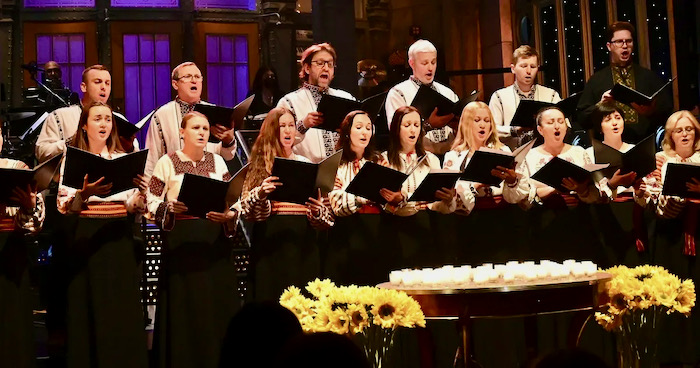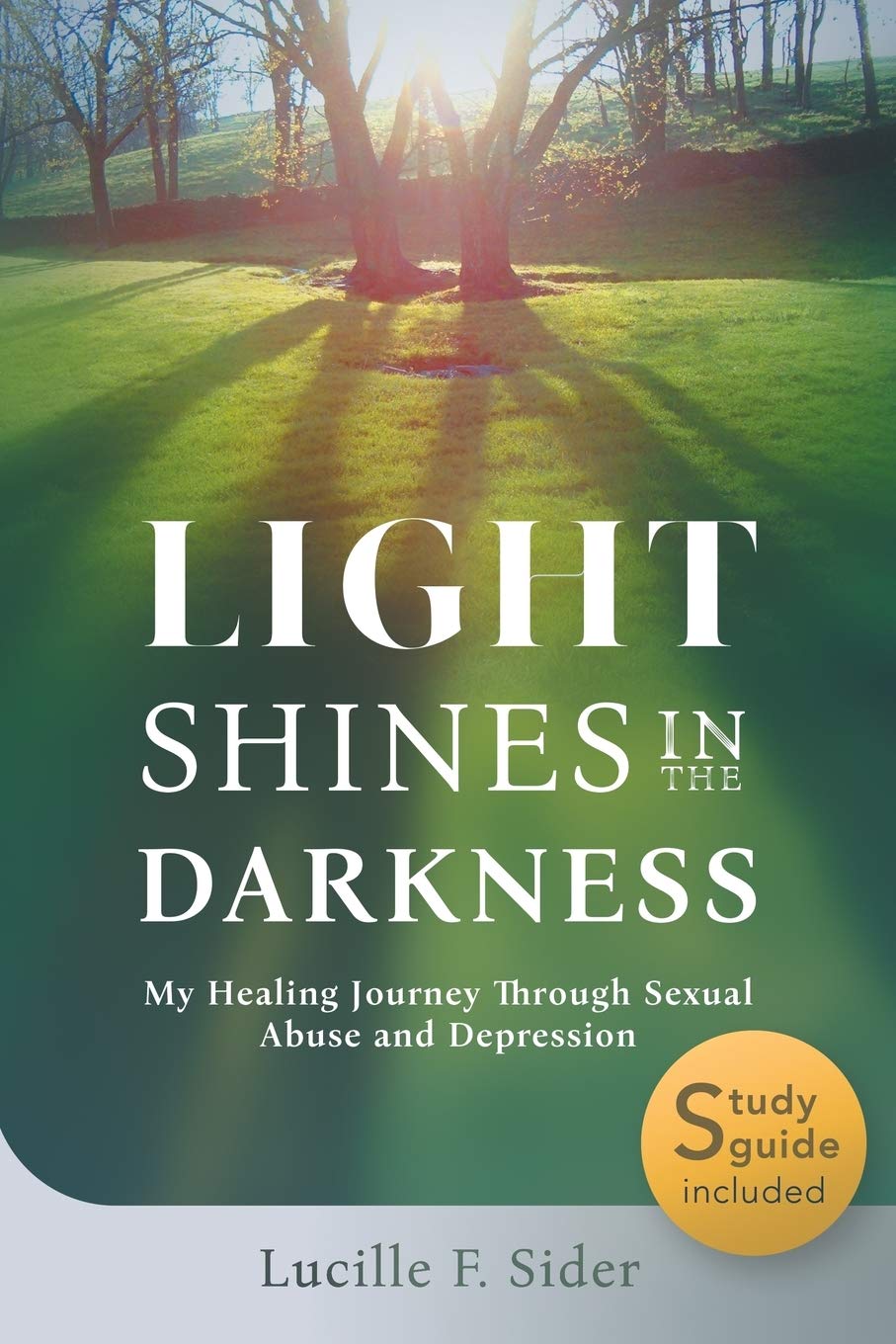.
By LUCILLE SIDER
Author of Light Shines in the Darkness
.
THIS SPRING, millions of Americans have bathed in waves of inspiration from the sight and sound of Ukrainian choirs singing for their nation’s life. From New York to Michigan to Idaho, Oregon and California, regional choirs have turned song into spiritual fuel—a movement that seems to have been sparked by the Saturday Night Live appearance of the Ukrainian Chorus Dumka of New York in February. If you missed that moving appearance, I have a video clip below.
I hope that, as so many of us are talking about these uplifting waves of music—we remember the traditional wisdom all of us share: Our spirits soar when we sing. It’s a truth in nearly all of the world’s great religious traditions. There’s an entire chapter devoted to the importance of daily singing in Benjamin Pratt’s Guide for Caregivers.
I grew up in an environment where singing was always present. Singing was about sharing music and fellowship with others. We sang at church, at school and at home. In fact, every Sunday evening we gathered around the piano with our mother playing. She had a beautiful low voice and I loved hearing her. Fortunately for me, I also had a low voice and soon I was singing right beside her.
The music was all Christian and our favorite was How Great Thou Art, the 19th-century hymn that was popularized by George Beverly Shay, the renowned musician for Billy Graham.
The other early memory was that of my grandfather holding me and singing a song he composed just for me. It was “Sweet Little Susie girl,” since Susie was my nick-name. My Grandpa took me fishing, he bought me ice-cream then he held, rocked me and sang, “Sweet little Susie Girl” until I was fast asleep in his arms.
Since that time I have sung my Grandpa’s song to every child I have held and rocked—with my favorite being the song adapted for my son Soren, “Sweet little Soren Boy.” Just last year I held and sang to 6-year-old Daryn.
I even sing to my cat PJ: “Sweet little PJ cat.”
In high school, I loved singing. In addition to the choir, I sang in both a Girls Quartet and a Mixed Quartet. The best part of the mixed group was standing by my boyfriend who sang bass, the lowest voice, thus providing the foundation for the higher singers.
At church I sang in a “ladies” trio and loved it. This was in Ontario, Canada, where I grew up and lived until I went to college in Pennsylvania. Since then I have lived in the US, but am proudly still a Canadian citizen with a permanent resident status.
I grew up assuming everybody could sing and carry a tune but was utterly shocked when, at age 20, I heard my new boyfriend sing joyfully, loudly, but totally out of tune! Totally! It was our first worship service and I had a hunch that this was the man I would marry. I was right about that and in all our years of marriage, he never, never sang on tune. He was a brilliant man, but never sang on tune! I felt badly for him that he never had the formative experience of singing in small groups.
In my younger years, singing with others was so important. The connection through singing together ran very deep. There was a joy in harmonizing with others, of hearing their voices and inserting my own low voice in a way that drew us all together, making us one.
The hymns from my childhood are etched in my consciousness and they, as well as more recent hymns, magically come to me every day as I awaken. I feel so blessed and I believe that those early hymns were foundational to my spirituality. Each morning I write out the hymn I wake up with and I make a practice of singing it during the day. This practice helps me stay stable emotionally and grounded spiritually.
One recent hymn that I have awakened with is:
Precious Lord take my hand.
Lead me on. Help me Stand.
I am tired, I am weak, I am worn.
Through the storms, through the night,
Lead me on to the light.
Precious Lord, lead me on.
I often think of these songs as responses to daily struggles, so I immediately asked myself: “What I am wrestling with that brings me this hymn?”
Soon I realized that it was about a relationship with a female relative that had grown tense recently. And I am grateful for the hymn because, when I saw her next, there was no tension at all!
Sometimes I compose short songs or chants. Often they emerge from my meditation. The one I sing most often is:
Let it come.
Let it go.
Let it come.
Let it flow.
All is well.
This chant arose from a time of meditation in the natural world. I was visiting my friend Frank in Pennsylvania. He invited us to experience an unusual form of meditation in which our group sat on lawn chairs in a shallow stream. Birds were singing and the water was gently flowing under our chairs and around our ankles. As I tried to settle down, I was quite agitated because I kept thinking about my beloved son who happened to be struggling with his vocation at that time. He had not found a job that was right for him and, as his mother, I was naturally anxious.
Then, as I focused on the stream in which we had positioned ourselves, I noticed the ripples in the water. They would come around my chair, then would gently flow on down in the stream. That’s when the opening words of the song that I shared above first came to me. They spoke deeply to me about my son. They challenged me to back off and let go of my agitation. They gently guided me to just let things go as they would. Just let them flow.
When I came out of the stream, I told my friend Frank about my experience and I quoted the words to him. He immediately added “All is well.” He was quoting a line from Julian of Norwich, a 12th century English mystic. Her famous words were:
All shall be well.
All shall be well.
All manner of things shall be well.
The next day I composed a tune to our chant. It was a simple tune but it added strength to the words. And for the next couple of days I found myself singing it, especially when I remembered that my son was going through a challenging time.
Frank and I have been singing it ever since. I find that this little chant can speak to people from all walks of life.
Most touching for me was the time I taught it to a group of people who were living with serious mental illness. I was one of the clergy leading them in a worship service once a week. I am open about the fact that, during my life, I have lived with mental illness. I know from experience—both professional and personal—that finding a mental balance involves “letting things go.” These dear people clearly understood “letting go.”
I then decided to add motions to the song to enhance the meaning of the words. For the words, “let it come, let it go” the motions were simply moving our arms back and forth. Before we knew it, we were gently swaying our bodies back and forth. Then in the last line, we opened our arms widely, singing. “All is well.”
Week after week I would join these dear people in worship and week after week, we would sway and sing, “Let it come, let it go. Let it come, let it flow. All is well.”
Currently I live in Chicago in the same apartment building where my friend Frank lives. He is a musician—an organist and pianist—so music is very much part of our lives. We have morning meditation together and currently are using the book, Common Prayer: A Liturgy for Ordinary Radicals.
Each day’s passage includes a short hymn. We sing the hymn together. Recent hymns have been I will trust in the Lord and We are marching in the light Of God.
In these times of war, we must hold tightly to God. This is our anchor—marching in the light of God.
I feel deeply blessed that music was part of my life as a child and it clearly was the foundation that I have enjoyed ever since.
Music can be a pathway toward peace. It is a way of relating deeply with others and deeply with God. It often brings me through a dark tunnel. I am so grateful for it. So very grateful.
What songs do you recall from childhood?
What songs might you sing today?
.
Care to see the Ukrainian choir singing on Saturday Night Live?
.
.
Care to Read More?
Lucille Sider inspires readers nationwide with Light Shines in the Darkness, her memoir about spiritual resilience in the aftermath of life-shattering trauma. She also is publishing a series of columns about the many ways men and women find themselves confronting trauma every day.
Here are some of her earlier columns:
- Her first story was The Perfect House.
- Then, All Manner of Things Shall Be Well.
- Taking on cancer ‘this step, each step’
- Knitting Our Lives Together
- Finding Resilience in the Midst of Winter Blues
- Do you have an animal friend in your life? They can help you make even more friends!
- Lucille Sider Shares a Creative Coleus Christmas wit her Community
- Trying to survive COVID however we can with pumpkin pie, prayer and all
- When disaster strikes, our resilience is rebuilt with helping hands
- ‘Act your age!’ may lead to healthy surprises


